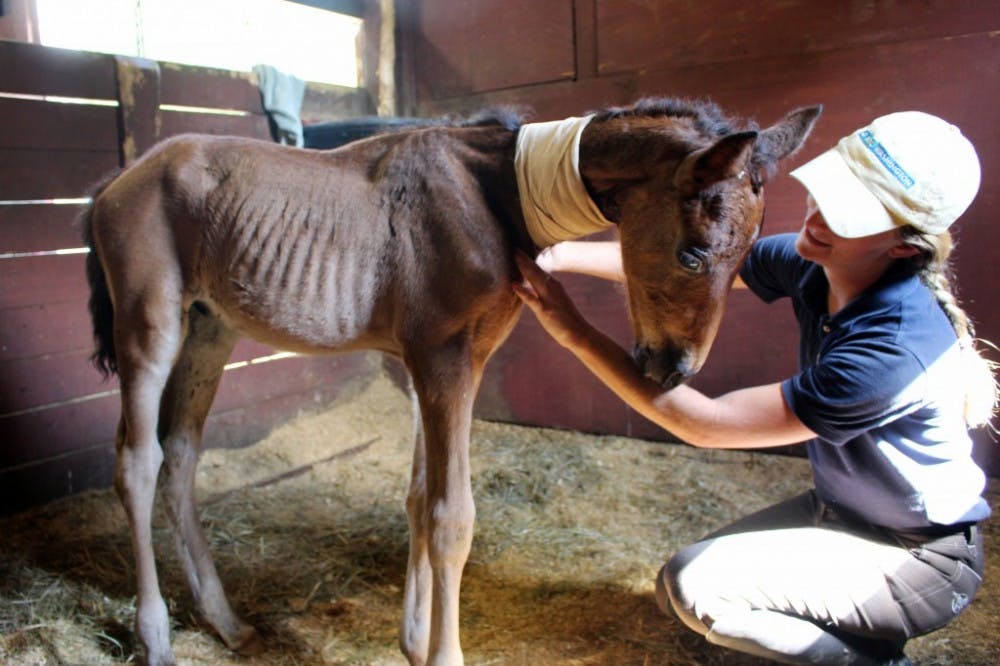Last spring, when Chance, Belle and Blue were loaded off of the horse-trailer that carried them 11 hours, from Last Chance Corral’s headquarters in Ohio to HighClere Farms in Burlington, it was clear the foals had been through a lot, especially 6 day-old Blue.
Within 24 hours, Blue needed a catheter to pump fluids into his tiny, frail body. Chance, with his donkey-like ears, was shaken up from travel but the healthiest of the bunch overall. And Belle, who wouldn’t let staffers touch her, had to have patches of raw, irritated skin treated.
These were baby horses at their most fragile state in need nourishment and immediate care. Had the HighClere staffers not followed a regimented feeding schedule, provided proper nutrients and watched the foals around the clock, that precious window of time could’ve been missed. Without HighClere, Blue, Chance and Belle would’ve suffered from malnourishment and died.
HighClere Farms is a local Burlington barn owned by Nicole Hamilton that boards and shows horses in addition to offering riding lessons. A full staff of trainers, barn assistants and instructors maintains its facilities. That first day, the HighClere staff acted as pseudo moms and watched over the newborns, tracking their progress while the foals’ respective mothers were elsewhere, providing milk for a more profitable thoroughbred. In the racing industry, the word “mother” doesn’t hold weight and doesn’t imply permanence. Mothering means providing for a hand-picked horse. It’s orchestrated. And the foals newly adopted by HighClere weren’t picked. They’re industry castoff’s called “nurse mare foals.”
According to Last Chance Corral’s webpage, HighClere’s adoption company of choice, the only reason “nurse mare foals” are born is so the mare produces milk. For her to produce nutrient-laden milk, she must be pregnant. The only reason she’s impregnated is so she’ll have the milk to nurture a thoroughbred foal — typically a racing horse. And amidst this shell-game, the thoroughbred’s mother can’t be bothered to nurse her own baby because she’s being shipped from stallion to stallion, forced to produce thoroughbred horses for a booming industry. The foal of a “nurse mare” is an afterthought. She has a product the racing industry needs to raise thoroughbred horses, her milk, and they exploit her for it, leaving her own babies, to die.
“Everyone in the horse industry knows about this, but the racing industry would never admit this practice is done,” said Amanda Martyn, assistant instructor at HighClere.
While “nurse mare foals” aren’t always abandoned or killed by racing industry breeders, a great volume of them indicates thorouhgbred breeding — their sheer existence serves as an industry red light.
“The racing industry gets to breed more horses, and more high quality horses, without having any delay,” said Kate Tackett, Elon senior and HighClere assistant trainer. “They can have their best mares producing constantly by doing away with [nurse mare] foals.”
Despite an optimistic statement from an industry representative, the issue remains prevalent.
“This is not a cruel business, said Kentucky Thoroughbred Association representative Lanny Kohnhorst, to the Times News. “Yes, there are bad people in the world — there are bad doctors and lawyers and mean people everywhere. But as an industry, we love horses from top to bottom. I’ve never dealt with anybody who didn’t care about these foals and horses.”
Martyn added it’s quite easy for higher-up representatives to claim cluelessness because they aren’t the ones with eyes on the thoroughbreds’ upbringings. That’s the job of industry breeders.
“They can just say they don’t have any control over the racers and breeders,” she said.
It’s the perfect loophole.
Facilities like HighClere have invested in counteracting the vicious cycle. They pumped Chance, Belle and Blue full of purchased colostrum-infused milk and got them all the nutrients they needed to survive. After rescuing the little trio, HighClere was determined to nurse them to health and help them emerge from vulnerable times, healthy and ready to grow. The foals were determined, too.
“Nicole’s goal was to raise them to work,” Martyn said. “She wanted to give them a job to do because they like having a job to do. She didn’t rescue them so she’d have lesson horses. She did it because it’s the right thing to do.”
The Burlington barn now owns five adopted foals and the only thing left to do is place their faith in the foals’ potential.
“You never know whether you’ll find a diamond in the rough,” said Martyn. Without being brought up as a thoroughbred, they face hard odds in the “race” to become a great horse, but there are always possibilities. “We might just find something truly special,” Martyn said.


